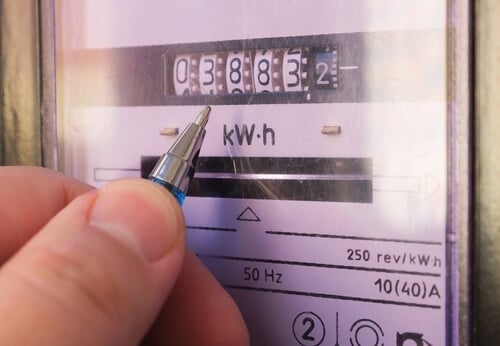Energy bills consist of 2 parts: a per unit (kWh) cost and a daily standing charge. In this guide, we'll look at how to calculate the price of electricity and gas per kWh in the UK.

What is a kilowatt hour (kWh)?
A kWh is the unit used to measure your electricity and gas usage. 1 kWh is the amount of energy used to run a 1,000-watt appliance for 1 hour. The more kWh you use, the higher your bills will be.
What’s the difference between a kW and a kWh?
A kW (kilowatt) is used to measure how much power an appliance uses at any time. 1 kW is equal to 1,000 watts, so if an appliance is rated at 500 watts, it means it uses 0.5 kW.
In contrast, a kWh (kilowatt hour) measures the amount of energy used over the period of an hour. For example, a 0.5 kW appliance uses 1 kWh of energy over a 2 hour period.
How much is a kWh of electricity in the UK?
According to the energy price cap, 1 kWh of electricity costs an average of 26.35p between 1 October and 31 December. But this can vary depending on:
- Where you live in the UK
- What tariff you're on
- Your energy supplier
What is the gas price per kWh in the UK?
Gas currently costs an average of 6.29p per kWh used.
What determines my electricity and gas cost per kWh on my energy bill?
How much you pay for your energy depends on:
- Your energy supplier: Different suppliers charge different amounts for energy. Usually this depends on how much they’ve paid for the electricity used to supply your home.
- The tariff you’re on: Is it fixed-rate or variable? The latter is subject to Ofgem’s energy price cap.
- When you consume your energy: Some tariffs, like Economy 7 and Economy 10, charge different rates for electricity at different times of day.
- How you pay for your electricity: Those who pay by Direct Debit get a discount.
- Where you live: Some parts of the country pay more for their electricity based on the costs of transporting it to their region.
- Your meter: Prepayment meters tend to be more expensive than standard credit meters.
You’re also subject to a daily standing charge. The current average electricity standing charge is 60.99p per day, but it will vary slightly depending on where you live.
How is kWh calculated for gas and electricity?
To work out gas or electricity kWh, you multiply an appliance’s power rating by the amount of time that it’s running.
How do I calculate kW to kWh?
To convert kW to kWh use this calculation:
Power (kW) x Time running (hours) = kWh
Remember, 1 kW equals 1,000 watts, so a 200-watt appliance is rated at 0.2 kW. Similarly, an hour equals 60 minutes, so each 15-minute block is the equivalent of 0.25 hours.
Here are some examples of electricity calculations based on common appliances:
| Usage | Power rating | Time running | Energy consumed (Power rating x Time running) |
|---|---|---|---|
|
Use a fan heater
|
1 kW
|
1 hour
|
1 kWh
|
|
Boil the kettle
|
3 kW
|
6 minutes (0.1 hours)
|
0.3 kWh
|
What is the average kWh usage and cost for a household?
According to Ofgem, the average UK household consumes 2,700 kWh of electricity and 11,500 kWh of gas every year. This is based on a 2-3-bedroom house containing 2-3 people. Based on the current energy price cap, it equates to around £711.45 for electricity and around £723.35 for gas.
Can I use kWh to compare energy deals?
Yes, you can use your own household’s kWh to compare energy deals. By providing your kWh energy usage you’re shown more relevant tariffs based on your actual usage rather than an estimate. You should be able to find this information on your latest energy bill.
How do I switch energy suppliers on Confused.com?
Use our energy comparison tool and follow this step-by-step process:
- Enter your postcode and address
- Enter your current supplier's details if you need to, including your tariff and usage from a recent bill
- Compare deals to find the best option for you
- Click ‘Switch today’ next to the deal you want and follow the prompts

